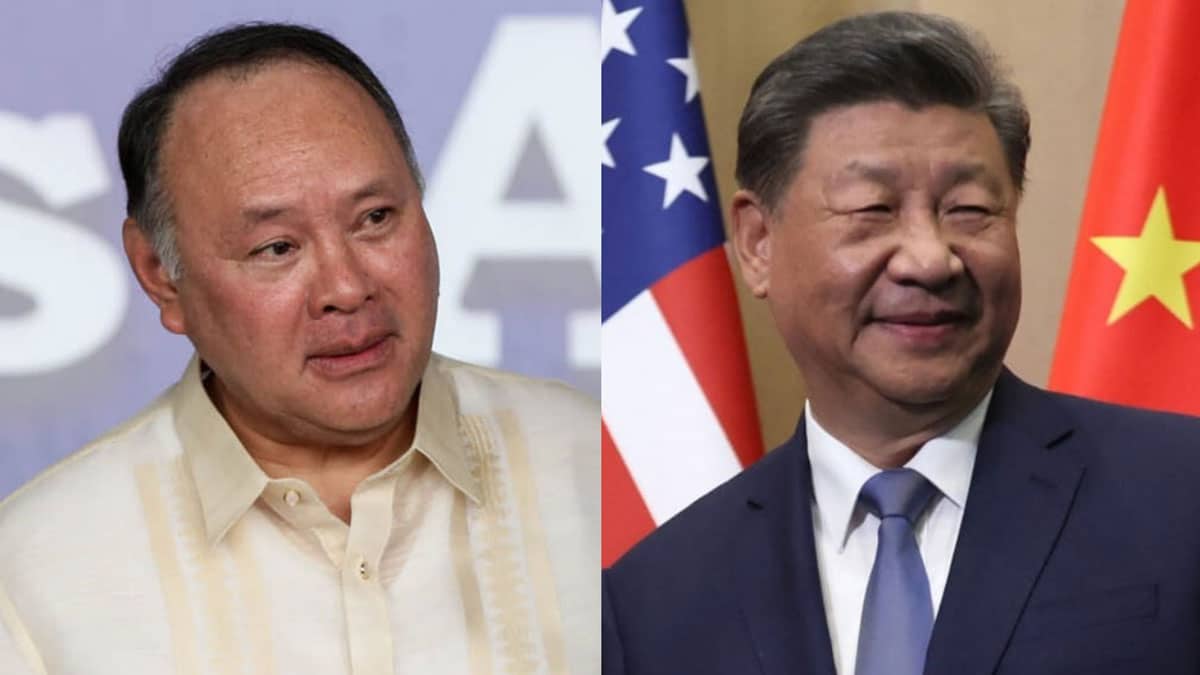Teodoro scoffs at China’s Xi’s call for ‘fairness,’ multipolarity

Defense Secretary Gilberto Teodoro Jr. Chinese President Xi Jinping (Photo by Leah Millis / POOL / AFP)
MANILA, Philippines — For Defense Secretary Gilberto Teodoro Jr., Chinese President Xi Jinping’s call to defend international “fairness” rings hollow.
Teodoro, who alluded to Xi’s remarks during the Shanghai Cooperation Organization (SCO) Plus, also said the Chinese leader’s stated push for multipolar world order will be ruinous to the Philippines and other smaller countries.
Xi, during his speech in north China’s port city Tianjin on Monday, said that SCO member states should “act to defend international fairness and justice” and “practice true multilateralism … in promoting a multipolar world.”
“Here is a country that wants a fairer international order,” Teodoro said of China in his keynote speech at the commemoration of the 80th end of World War II in Baguio City’s Camp John Hay on Wednesday. “But when you examine, is their society fair? Is their society free? The answer is obvious. No.”
READ: Teodoro on PH-US WWII victory: ‘Can we rest on our laurels?’
“So fair for these countries is a euphemism for advancing their agenda and interests, which are contrary to our stated interests,” Teodoro further said.
Teodoro, speaking before World War II veterans, diplomats, and other key military and government officials, said the hard-earned peace could not be maintained “if we do not work towards a sustainable peace that is founded on principles of law — not multipolarity — but multilateralism.”
Asked to expand the most operative words in his speech — that is, his calls against multipolarity — the Defense chief doubled down.
Teodoro said China’s call for multipolar order leads to “transactional” relationships as opposed to multilateral ones, which he said are based on international law.
“When you say transactional, the small are the ones who suffer — it’s always like that,” the defense chief said in an ambush interview after the event. ”If it’s multilateral, the agreement is based on international law, so at least small countries don’t lose out.”
Teodoro cited as an example the country’s move to challenge Beijing’s sweeping sovereignty claims in the South China Sea before an international tribunal, which led to the 2016 Arbitral Award ruling heavily in favor of Manila’s sovereign rights, but not without concessions.
“We won the Arbitral Award on some points, lost on some points. But we brought it up in a fair manner,” he said.
This was as opposed to the proponents of multipolar world order, like China that prefers arrangements like “gentleman’s agreement,” which they claimed to have with Manila when it comes to the West Philippine Sea arrangements.
“Under multipolarity, it’s not like that. It’s all about consensus discussion. So when it comes to discussion, what kind of discussion can we have with China, can they be trusted? No. Then it’s all about whisperings, all gentlemen’s agreements. That’s what we don’t want,” he said.
Chinese foreign policy expert Denny Roy said China’s idea of multipolarity means it would be “more empowered to pursue its self-interests, unencumbered by US alliances, security partnerships or liberal norms.”
“China’s notion of multipolarity includes China being the dominant country in eastern Asia and the western Pacific rim, unchecked by US influence,” Roy, a senior fellow of East-West Center, said in an email to Inquirer on Thursday.
Security expert Chester Cabalza also expressed concerns with multipolarity, saying it could lead to “more dangers and security anxieties in the world.”
“There will be different axis of powers to control world affairs, unlike a bipolar or unipolar world where nations have binary options or would just follow the dominant order,” Cabalza, president of the Manila-based think tank International Development and Security Cooperation, said in a message to Inquirer on Thursday.
Roy said resisting China’s influence “might be impossible if the US decided not to maintain its current role of strategic leader in the Asia-Pacific.”
“Life for the Philippines would probably not improve if China sets the rules for the region and enjoys veto power over its neighbors’ foreign policies,” he added.
Aside from upholding multilateralism, Manila should continue to be a proponent of minilateralism, which emphasizes shared interests on specific issues, according to Cabalza.
READ: West PH Sea: Recent US-PH-Japan sea drills viewed as ‘counter-China’ effort
“In minilateral engagements, Manila receives beneficial results like in SQUAD and BIMP-EAGA,” Cabalza also said, referring to the quadrilateral grouping comprising of United States, Australia, Philippines and Japan as well as the Brunei Darussalam-Indonesia-Malaysia-Philippines East Asean Growth Area.
“Manila has always been a champion for multilateralism, having dozens of multilateral economic and security partnerships,” he continued.
Manila’s role as co-founder of the United Nations and Association of Southeast Asian Nations stands as “strong pillars to our multilateralism,” according to the expert. /das/mcm
For comprehensive coverage, in-depth analysis, visit our special page for West Philippine Sea updates. Stay informed with articles, videos, and expert opinions.


















